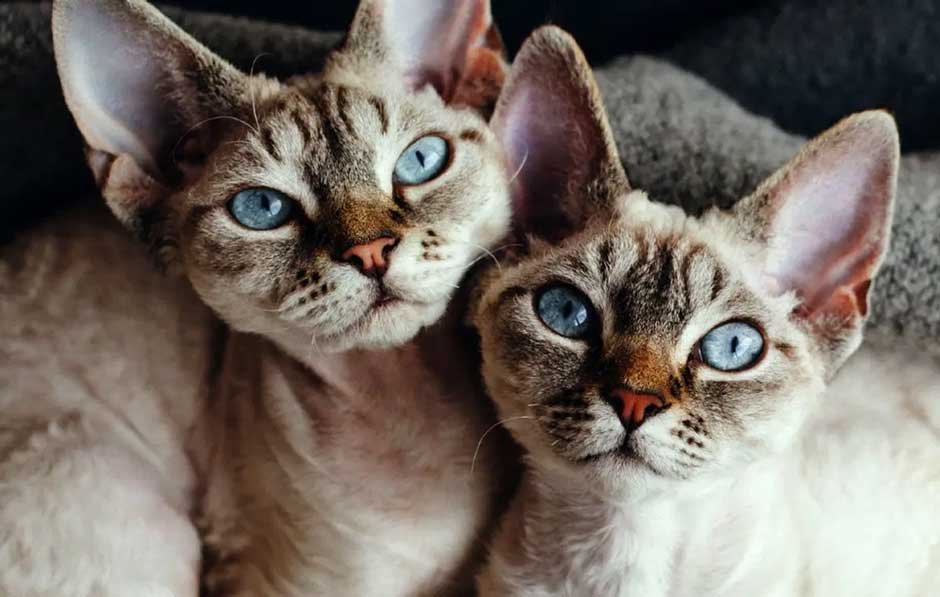Cat enthusiasts often find themselves drawn to the unique and captivating aesthetics of the devon rex and sphynx breeds. With their alien-like features, oversized ears, and striking personalities, it’s easy to see why these two breeds garner so much attention. But despite some surface-level similarities, the devon rex and the sphynx are distinctly different in their physical traits, grooming needs, temperament, and health profiles. If you’re considering bringing one of these cats into your life — or are simply curious about what sets them apart — this article is your guide to understanding the fascinating distinctions between these two standout felines.
Whether you’ve been browsing listings for devon rex kittens for sale or researching the enigmatic sphynx, it’s important to dive deeper than just appearance. Let’s break it down.
Appearance: the first impression
At first glance, both the devon rex and the sphynx share a certain “otherworldly” look. Large ears, slim bodies, and expressive eyes are hallmarks of both breeds. However, the most obvious difference is fur — or the lack of it.
- Devon rex: This breed is known for its short, soft, wavy coat. The devon rex’s fur is made up mostly of down hairs (the softest of the three hair types on cats), giving it a suede-like texture. This coat is delicate and can be sparse in some areas, particularly around the belly, neck, and ears.
- Sphynx: Contrary to popular belief, the sphynx is not completely hairless. They often have a fine layer of peach-fuzz-like down that gives their skin a warm, suede feeling. However, they lack the fur coat of the devon rex and require special care to maintain clean, healthy skin.
Their body shapes also differ: the sphynx is muscular and stocky with a barrel chest, while the devon rex is slender, with long legs and a more delicate frame.
Grooming and care needs
Though neither breed has a thick coat that requires brushing, they are not considered low-maintenance.
- Devon rex: Despite having fur, devon rex cats do not need frequent brushing — in fact, too much brushing can damage their fragile coat. However, their ears and paws accumulate oil and should be cleaned regularly. Bathing is only needed occasionally.
- Sphynx: These cats require regular baths, often weekly. Their skin produces oil that would normally be absorbed by fur, but with no coat to soak it up, it accumulates on the skin and can lead to greasy buildup or even skin infections. Sphynx cats also need ear cleaning and nail care more frequently than other breeds.
So while their grooming needs differ, both breeds demand consistent upkeep to keep them healthy and comfortable.
Temperament and personality
When it comes to personality, the devon rex and sphynx are both incredibly affectionate, social, and intelligent. But there are subtle differences in how they express their love and interact with the world around them.
- Devon rex: Often described as a mischievous pixie or a tiny comedian, the devon rex is full of energy and curiosity. They love high places and are excellent jumpers. Devons tend to bond closely with their humans and may follow them from room to room. They’re playful well into adulthood and often do silly things to get your attention.
- Sphynx: If the devon rex is a pixie, the sphynx is a cuddly clown. They’re known for being very people-oriented and almost dog-like in their loyalty. They crave warmth and will snuggle into blankets or curl up against their human for comfort. Sphynx cats are also highly intelligent and playful, but their manner is often gentler and more openly affectionate than the impish devon rex.
Both breeds are incredibly social and don’t do well being left alone for long periods. They thrive in households where someone is often home or where they have other pets to keep them company.
Health and lifespan
Both breeds are generally healthy but can be prone to certain genetic conditions and require responsible breeding practices.
- Devon rex: Common health concerns include patellar luxation (loose kneecaps), hypertrophic cardiomyopathy (a form of heart disease), and hereditary myopathy (a muscle disorder). Their fine coat also makes them sensitive to temperature changes.
- Sphynx: Sphynx cats are prone to hypertrophic cardiomyopathy as well. Additionally, their lack of fur makes them vulnerable to sunburn and skin issues if not bathed and protected properly. They can also experience respiratory issues due to their narrow nasal passages.
Both breeds typically live between 12–15 years, though many cats live longer with proper care, nutrition, and regular veterinary check-ups.
Allergies and hypoallergenic myths
There’s a common misconception that hairless or short-haired breeds are hypoallergenic. Unfortunately, neither the devon rex nor the sphynx is truly hypoallergenic. Cat allergies are usually caused by a protein (Fel d 1) found in a cat’s saliva, skin, and dander — not just fur.
That said, some allergy sufferers do report fewer symptoms around these breeds, possibly due to their grooming habits or the reduced amount of shedding. If you’re allergic, it’s essential to spend time around either breed before committing to adoption.
Cost and availability
If you’re searching for a new feline companion, you might have noticed that neither of these breeds comes cheap. Due to their unique looks, personality traits, and the challenges involved in ethical breeding, devon rex and sphynx cats often come with a high price tag.
- Devon rex kittens from reputable breeders typically range from $1,000 to $2,000 depending on lineage, location, and breeder practices.
- Sphynx cats can range from $1,500 to $3,000 or more, especially if they are show quality or come from champion bloodlines.
When looking for either breed, it’s important to seek out ethical breeders who test for genetic diseases, prioritize the health and socialization of kittens, and don’t cut corners to maximize profit.
Which breed Is right for you?
The decision between a devon rex and a sphynx ultimately comes down to your lifestyle, preferences, and willingness to meet their unique care needs.
- Choose a devon rex if you want a high-energy, playful, and somewhat mischievous companion that requires less bathing and enjoys leaping to high places.
- Choose a sphynx if you crave a constant cuddle buddy who will curl up under the covers with you and don’t mind giving weekly baths and extra skincare.
Both breeds offer endless love, companionship, and character. Their devotion and quirky ways make them unforgettable members of the family. Just remember — these aren’t cats you adopt on a whim. They require effort, attention, and a bit of extra care, but the reward is a one-of-a-kind feline bond that lasts a lifetime.
Whether you’ve got your heart set on a sphynx or are just starting to explore options like devon rex kittens for sale, one thing’s for sure: you’re in for a delightfully unusual and deeply rewarding adventure.







